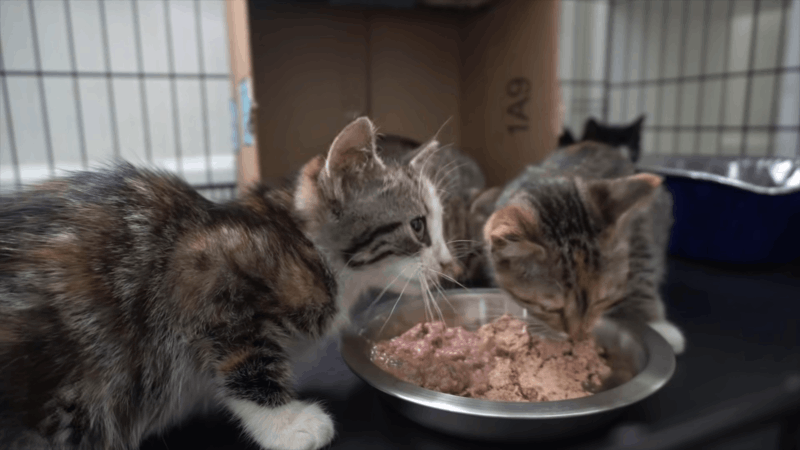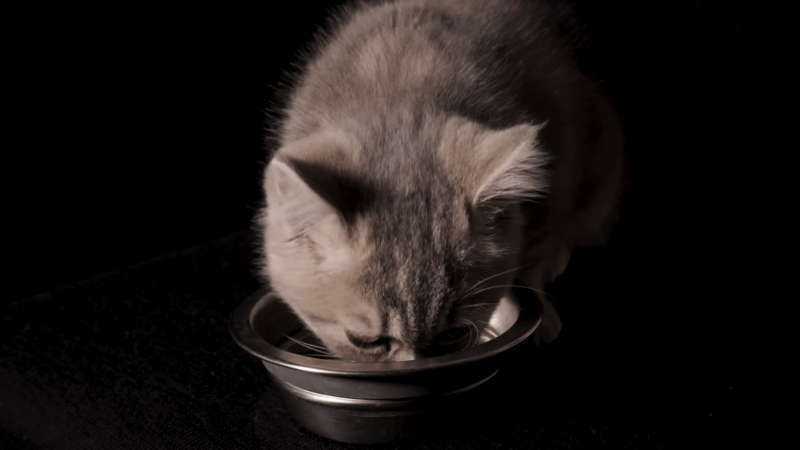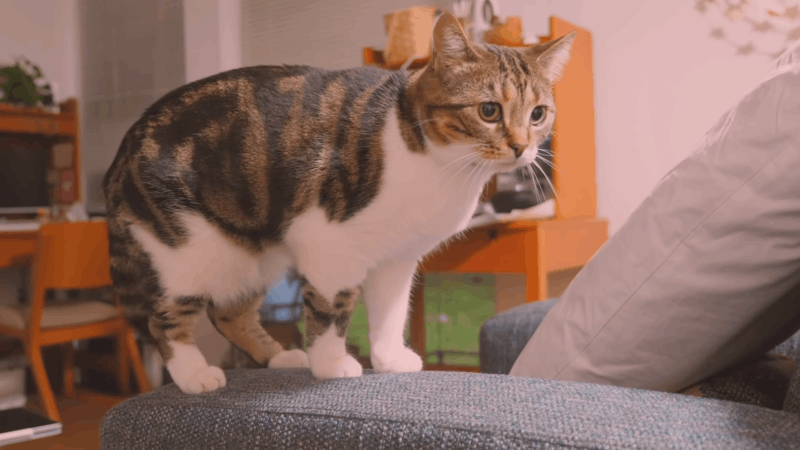No products in the cart.
Calming chews for cats, designed to help reduce anxiety, stress, and promote relaxation, are specially formulated treats that provide a convenient and enjoyable solution for feline companions. If you have a cat that experiences anxiety-related issues, these chews can be a valuable tool in providing relief. In this blog post, we will discover what are calming chews for cats, factors to consider when choosing calming chews for cats, and tips to pick the best calming chews for cats.
What Are Calming Chews for Cats?
Calming chews for cats are specially formulated treats that help reduce anxiety, stress, and promote relaxation in cats. These chews are typically made with natural ingredients known for their calming properties. They offer a convenient and enjoyable way to provide relief to cats experiencing anxiety-related issues.

Key Ingredients Found in High-Quality Calming Chews
High-quality calming chews for cats often contain a combination of natural ingredients known for their calming effects. Some key ingredients commonly found in these chews include:
- Natural herbs: Cats can benefit from being relaxed when given natural herbs with relaxing characteristics like chamomile, valerian root, passionflower, and lavender.
- Amino acids: L-theanine is a commonly used amino acid in calming chews. It is well-known for bringing about relaxation and lowering anxiety by boosting the production of neurotransmitters that encourage serenity.
- Vitamins and minerals: Cats may become calmer when they consume tryptophan, magnesium, and B vitamins. They help support a healthy nervous system and can contribute to reducing anxiety.
The Benefits of Cat Calming Chews
The benefits of cat calming chews include:
- Reducing stress and anxiety: Calming chews can help soothe cats during stressful situations such as fireworks, travel, vet visits, or changes in their environment.
- Promoting relaxation: The ingredients in calming chews can help induce a sense of calmness and relaxation in cats, reducing restlessness or hyperactivity.
- Supporting overall well-being: Calming chews contribute to a cat’s overall emotional and mental well-being by providing a natural and non-invasive solution to anxiety-related issues.
Signs Indicate a Calming Chew Is Effective for Cats
Signs that indicate a calming chew is effective for a cat can vary depending on the individual cat and the specific situation. However, some common signs that suggest calming chews are working include:
- Reduced restlessness: If the cat exhibits less pacing, agitation, or restless behavior, it indicates that the calming chew is helping to promote a sense of calmness.
- Decreased signs of anxiety: A reduction in excessive meowing, hiding, or aggressive behavior can be an indication that the calming chew is effectively reducing anxiety in the cat.
- Improved ability to relax: If the cat becomes more relaxed and settled in situations that would typically trigger anxiety, it suggests that the calming chew is having a positive effect.
- Increased willingness to engage: Cats that are feeling less anxious may show more interest in activities or interact with others, indicating that the calming chew is helping to alleviate anxiety.
- Restored appetite and reduced stress-related behaviors: If a cat’s appetite returns to normal and stress-related behaviors such as excessive grooming or scratching decrease, it indicates that the calming chew is positively impacting the cat’s emotional state.
Negative Effect of Cat Calming Chews
While cat calming chews are generally safe and well-tolerated by most cats, there are potential negative effects to be aware of.
- Gastrointestinal upset: Some cats may experience mild digestive issues such as diarrhea or vomiting when first introduced to calming chews.
- Allergic reactions: Certain ingredients in calming chews may cause allergic reactions in sensitive cats, leading to symptoms such as itching, swelling, or skin irritations.
- Overdosing: Giving your cat more than the recommended dosage of calming chews can lead to unwanted effects. It’s important to follow the manufacturer’s guidelines and not exceed the recommended amount.
- Inappropriate chews for age or health condition: Using calming chews that are not suitable for your cat’s age or health condition can have negative effects. For example, certain ingredients may not be safe for kittens or cats with specific medical conditions.
- Drug interactions: If your cat is taking any medications, it’s essential to consult with a veterinarian before using calming chews. Some ingredients in the chews may interact with certain medications, potentially causing adverse effects.
- Behavioral changes: While rare, some cats may exhibit unusual behaviors or reactions to calming chews. It’s important to monitor your cat closely after giving them the chews and discontinue use if any concerning behavioral changes occur.
The Time for Calming Chews Take to Show Effects on Cats
The time it takes for calming chews to show noticeable effects in cats can vary. Some cats may experience the calming effects relatively quickly, within 30 minutes to an hour after consuming the chew. However, for other cats, it may take a few days or even weeks of consistent use to observe significant changes in their behavior or anxiety levels.
Factors to Consider when Choosing Calming Chews for Cats
When selecting calming chews for cats, several factors should be considered
- Cat’s individual needs: Take into account the age, size, and health condition of your cat. Some chews may be specifically formulated for certain age groups or health conditions.
- Quality and safety: Choose reputable brands that prioritize quality and safety. Look for products that have undergone testing and meet certain quality standards.
- Ingredient list: Check the ingredient list for potential allergens or additives that may not be suitable for your cat. Avoid chews with artificial colors, flavors, or preservatives.
- Customer reviews and testimonials: Reading reviews from other cat owners can provide insights into the effectiveness and satisfaction of a particular calming chew.

How Cat Calming Chews Work?
Cat calming chews work by utilizing a combination of natural ingredients that have calming properties. These ingredients can help regulate the cat’s neurotransmitters, which are responsible for transmitting signals in the brain. By promoting the production of calming neurotransmitters or reducing the levels of stress-inducing neurotransmitters, calming chews can help soothe anxiety and promote relaxation in cats. The specific mechanisms of action may vary depending on the ingredients used in the chew.
Impact of Cat Chew Ingredients on Cat Body
The key ingredients found in cat chews can have a significant impact on a cat’s body. These ingredients are carefully selected for their specific properties and benefits:
- Protein: Protein is a vital component for cats and is important for many body processes. It aids in the growth and upkeep of muscles, tissues, and organs. Cat chews with high-quality protein sources support a cat’s general health and wellbeing.
- Vitamins and Minerals: Minerals and vitamins are crucial for a cat’s general health and healthy body processes. They support various processes, including immune system function, energy metabolism, and bone health. Cat chews often contain specific vitamins and minerals to provide additional nutritional support.
- Omega-3 Fatty Acids: Cats can benefit greatly from omega-3 fatty acids like EPA (eicosapentaenoic acid) and DHA (docosahexaenoic acid). They promote healthy skin and coat, support brain and eye development, and have anti-inflammatory properties. These fatty acids are often included in cat chews to support overall health and well-being.
- Taurine: Taurine is an essential amino acid for cats. It plays a vital role in maintaining proper heart function, vision, and reproductive health. Cat chews may contain taurine to ensure cats receive an adequate amount of this crucial nutrient.
- Dental Health Ingredients: Some cat chews are formulated to promote dental health. They may contain ingredients like enzymes, chlorophyll, or abrasives that help reduce plaque and tartar buildup, freshen breath, and maintain oral hygiene.
The Difference Between Calming Chews for Cats and CBD Cat Chews
Calming chews for cats are treats formulated with natural ingredients known for their calming properties, aiming to reduce anxiety and promote relaxation in cats. On the other hand, CBD cat chews contain cannabidiol (CBD) derived from hemp and CBD chews interact with the cat’s endocannabinoid system to potentially alleviate anxiety. While both types of chews target anxiety in cats, the main difference lies in their active ingredients and mechanisms of action. You can find more amazing CBD products for your pets at: Pet CBD Club
Ingredients Need to Avoid When Choosing Calming Chews for Cats
When choosing calming chews for cats, there are certain ingredients that cat owners should avoid. These include:
- Artificial Colors and Flavors: Artificial colors and flavors serve no nutritional purpose and may not be well-tolerated by all cats. They can also increase the risk of allergic reactions or gastrointestinal upset. Opt for chews that use natural ingredients to enhance flavor and appearance.
- Allergens: Check the ingredient list carefully for common allergens like wheat, soy, or corn. These substances may negatively affect cats with food sensitivities or allergies, leading to gastrointestinal difficulties, skin conditions, or other allergic reactions. Opt for chews that are free from known allergens or that cater to your cat’s specific dietary needs.
Tips to Pick the Best Calming Chews for Cats
- Check the ingredient list: Look for calming chews that contain natural ingredients known for their calming properties, such as chamomile, valerian root, or L-theanine. Avoid chews with artificial additives or unnecessary fillers.
- Consider your cat’s preferences: Cats have individual preferences for flavors and textures. Choose chews that your cat will enjoy, as they are more likely to consume them willingly.
- Read customer reviews: Look for feedback from other cat owners who have used the calming chews. Their experiences can provide valuable insights into the effectiveness and palatability of the product.
- Consult with a veterinarian: A veterinarian can offer suitable soothing chews depending on your cat’s unique needs if you have any worries or special requirements for your cat.
- Excessive Sugar or Sweeteners: Since cats do not naturally appreciate sweetness, consuming too much sugar or sweetener can cause weight gain, dental issues, or even diabetes. Steer clear of chews that have a lot of added sugar or other artificial sweeteners, such as xylitol.
- Chemical Additives: Check the ingredient list for any potential chemical additives or fillers. These substances might not be necessary and could be dangerous to cats.

Conclusion
Calming chews for cats are specially formulated treats that offer a convenient and enjoyable way to reduce anxiety, stress, and promote relaxation. It is important to avoid ingredients like artificial colors and flavors, allergens, excessive sugar or sweeteners, and chemical additives. Although they are generally safe, it is important to watch for any potential adverse effects and adhere to dosage recommendations.
I am Nelson Cooper, I pursue my passion for writing and my belief is that cats love humans. I enjoy traveling and have a deep appreciation for the beauty of nature, as well as a soft spot for animals, particularly cats.


